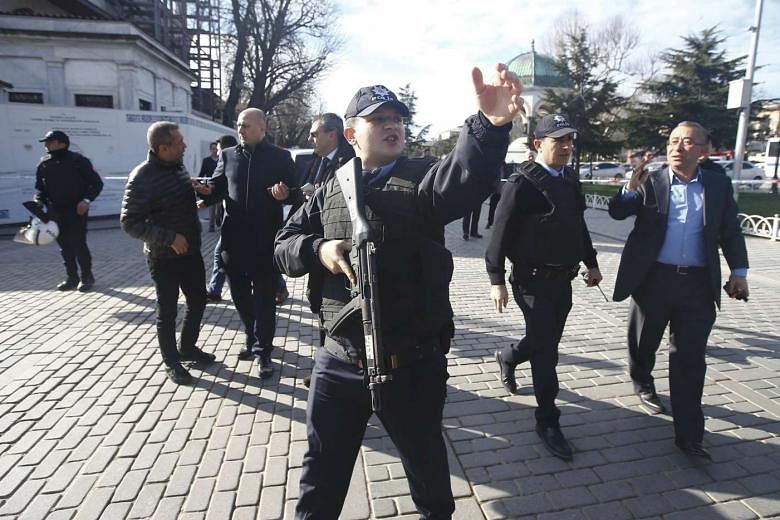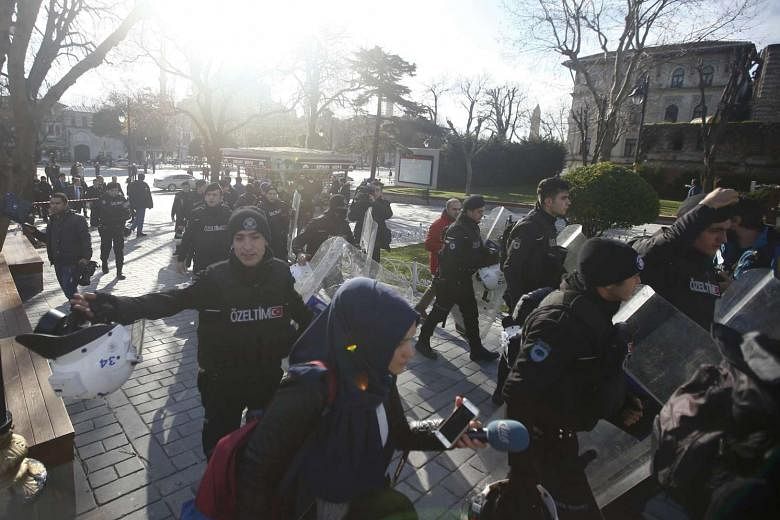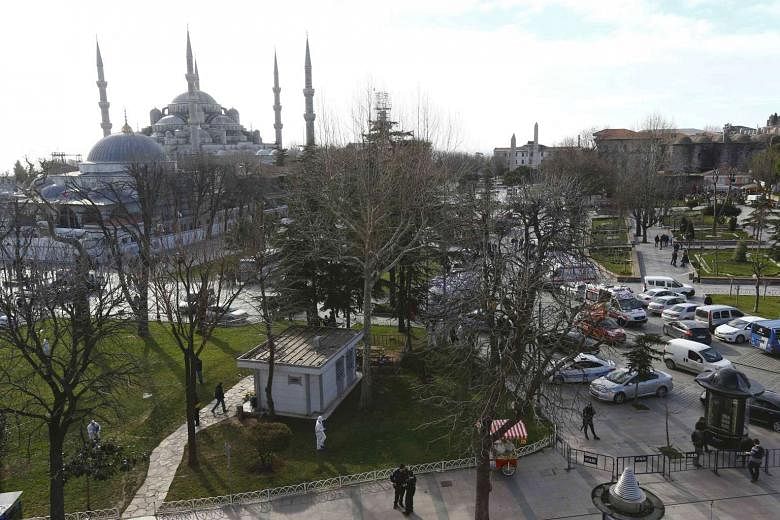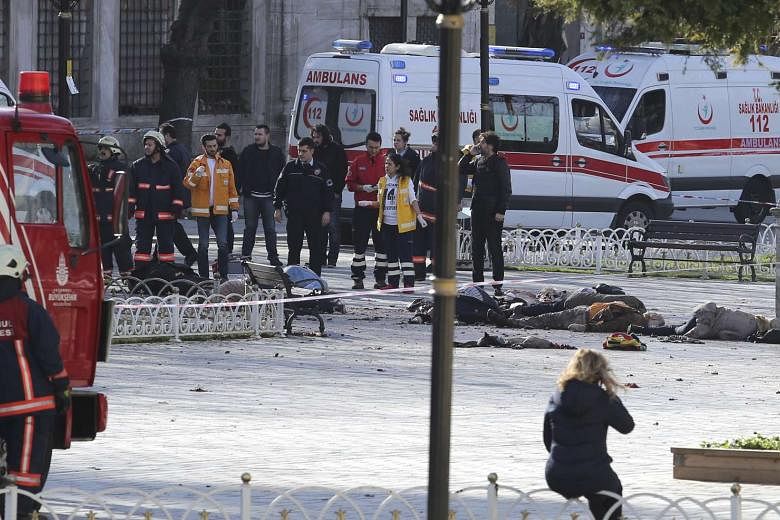ISTANBUL (REUTERS/AFP) - At least nine of the people killed in a suicide bombing in Istanbul's historic tourist district on Tuesday (Jan 12) were German citizens, a senior Turkish government official said.
Sources in Turkish Prime Minister Ahmet Davutoglu's office told Reuters that most of those killed were Germans and that Mr Davutoglu had spoken by phone with Chancellor Angela Merkel to express condolences.
Peru's Foreign Ministry also confirmed that one Peruvian man was killed and a Peruvian woman wounded in the attack.
The large explosion rocked a square in the historic Sultanahmet district of Istanbul and killed at least 10 people and injured 15 others, a statement from the Istanbul Governor's office said earlier.
Mr Erdogan said a Syrian suicide bomber is thought to have been responsible for the explosion. "I condemn the terror incident in Istanbul assessed to be an attack by a suicide bomber with Syrian origin. Unfortunately we have 10 dead including foreigners and Turkish nationals... There are also 15 wounded," Mr Erdogan told a lunch for Turkish ambassadors in Ankara, in a speech broadcast live on television.
There is a high probability that Islamic State in Iraq and Syria (ISIS) militants were responsible for the attack, two senior Turkish security officials told Reuters.
Mr Davutoglu also told Dr Merkel during the same phone call that the details of an ongoing investigation regarding the suicide attack, thought to have been carried out by a Syrian suicide bomber, would be shared with German officials.
Turkish Deputy Prime Minister Numan Kurtulmus said the suspected suicide bomber had been identified from body parts as a Syrian national born in 1988, and that his links were being investigated.
Mr Kurtulmus also told a news conference in Ankara that two of the 15 people wounded in the attack were in a serious condition.
Turkish Prime Minister Ahmet Davutoglu earlier convened an emergency security meeting of key ministers and officials after the attack. Those taking part in the meeting included the powerful Interior Minister Efkan Ala and spy chief Hakan Fidan, the Anatolia news agency said.
Investigations were being conducted into the type of explosive which caused the blast and those responsible, the governor's office statement said.
"The explosion was very loud. We shook a lot. We ran out and saw body parts," one woman who works at a nearby antiques store told Reuters, declining to give her name.
Several bodies lay on the ground in the Sultanahmet square, which is close to the Blue Mosque and Hagia Sophia, in a major tourist area of Turkey's most populous city.
A police officer and witness at the scene reported seeing several bodies and body parts.
Ambulances rushed to the scene of the explosion in. They ferried away the wounded as the police cordoned off streets.
"We're taking precautions against a second explosion," the police officer said, ushering people out of the square.
Witnesses reported hearing a loud blast and video footage on the CNN Turk channel showed the police and ambulances at the scene.
Foreign tourists from Germany and Norway are among those wounded in the explosion, Turkey's CNN Turk television said.
An official from one tour company who declined to be identified told Reuters that a tourist group from Germany was in the area at the time of the blast.
Germany warned its citizens to avoid crowds and tourist sites in Istanbul. "Travellers in Istanbul are strongly urged to avoid for now large groups of people in public places as well as tourist attractions and to stay abreast of the situation via these official travel advisories and the media," the Foreign Ministry said.
A Norwegian man was injured in the blast, and is currently receiving treatment in a Turkish hospital, Norway's Foreign Ministry said on Tuesday. "It's not a life-threatening injury," spokesman Guri Solberg of the Norwegian ministry told Reuters.
The Korea Herald also reported that an unidentified number of South Koreans were injured during the explosion.
South Korea's consulate-general in the ancient city is examining the incident in the popular tourist hotspot of Sultanahmet, it said.
A local tour guide told Yonhap news agency that two Koreans, including himself, suffered "slight wounds" such as on their fingers and "several" travellers from other countries were killed. "We heard an enormous blast as I briefed my clients at the square," the guide was quoted as saying.
Singapore's Ministry of Foreign Affairs (MFA) issued a travel advisory for Turkey on Tuesday.
"Singaporeans travelling to or residing in Istanbul are advised to remain vigilant and take the necessary precautions for their personal safety, including monitoring the local news and heeding the instructions of the local authorities," MFA said.
The ministry also warned against traveling to the border regions between Turkey and Syria due to the ongoing conflict in Syria.
Singaporeans who require help can contact the Singapore Embassy in Ankara or the MFA Duty Officer at +65-6379-8800/8855.
The force of the blast was sufficient to be heard in adjacent neighbourhoods, witnesses told AFP.
Police cordoned off the area to shocked passers-by and tourists and the nearby tram service has been halted.
"The explosion was so loud, the ground shook. there was a very heavy smell that burned my nose," a German tourist named Caroline told AFP.
"I started running away with my daughter. We went into a nearby building and stayed there for half an hour. It was really scary," she added.
"We heard a loud sound and I looked at the sky to see if it was raining because I thought it was thunder but the sky was clear," said Kuwaiti tourist Farah Zamani, 24, who was shopping at one of the covered bazaars with her father and sister.
"Ambulances started rushing in and I knew it was a bomb right away because the same thing happened here last year," said Mr Ali Ibrahim Peltek, 40, who operates a kiosk selling snacks and drinks on the square. "This is not good for Turkey but everyone was expecting a terrorist attack," he said.
Mr Davutoglu's office imposed a broadcasting ban on the blast, invoking a law which allows for such steps when there is the potential for serious harm to national security or public order.
Media reports said the blast took place at 8.20am GMT(4.20pm Singapore time) around the Obelisk of Theodosius, a monument from ancient Egypt which was re-erected by the Roman Emperor Theodosius and is one of the city's most eye-catching monuments.
The blast came after a slew of deadly attacks across Turkey in past months that has left Turkey's largest city on edge.
Turkey had been on alert after 103 people were killed on Oct 10 when two suicide bombers attacked a crowd of peace activists in the capital Ankara, the bloodiest strike in the country's modern history.
That operation was blamed on Islamic State in Iraq and Syria (ISIS) militants, as were two other bloody assaults in the country's Kurdish-dominated south-east earlier in the year.
The Turkish authorities have in recent weeks detained several suspected ISIS members, with officials saying they were planning attacks in Istanbul.
Turkey is also waging an all-out assault on the outlawed Kurdistan Workers' Party (PKK), which has staged dozens of deadly attacks against members of the security forces in the south-east of the country.
A Kurdish splinter group, the Freedom Falcons of Kurdistan (TAK) claimed a mortar attack on Istanbul's second international airport on Dec 23, which killed a female cleaner and damaged several planes. Meanwhile the banned ultra-left Revolutionary People's Liberation Party-Front (DHKP-C) has also staged a string of usually small-scale attacks in Istanbul over the last months.




